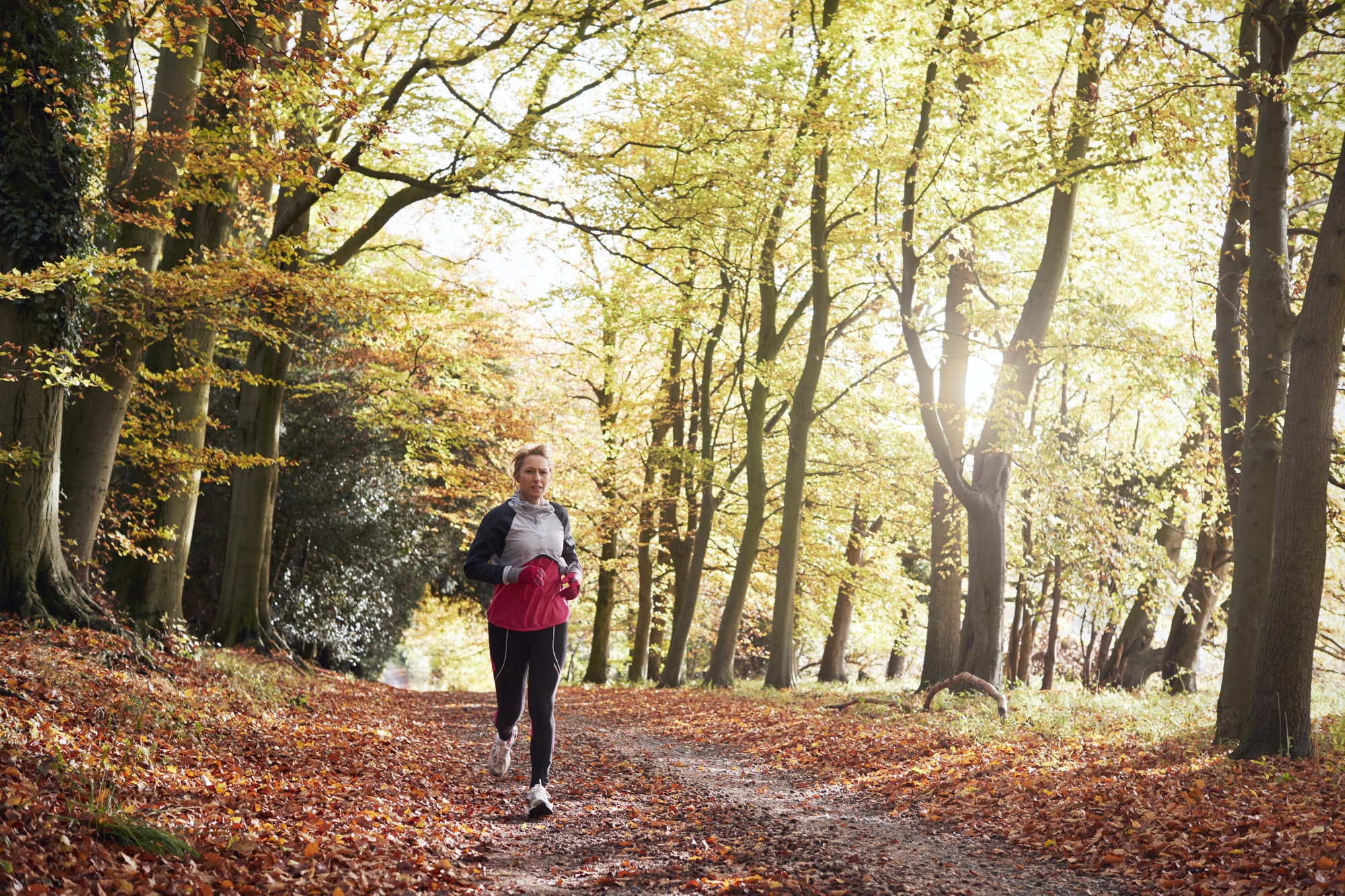We’ve all heard stories at one time or another of intense runners who lose their periods. Whether you’re a serious runner and do not want to stop training once a month, or a beginner runner and want to keep moving, running during your period is okay for most people. Exercise is a natural stress relief, which can be especially beneficial during your period.
Still, there’s nothing worse than planning a run and then waking up with the aches of period cramps. Instead of getting in your miles for the day, you end up lying on the couch with your favorite snacks.
Many women report that running makes their period stops, becomes lighter/heavier, or comes earlier due to running. However, researchers haven’t found significant evidence that a menstrual cycle affects a woman’s ability to exercise, because every women’s body is different, and their periods will react differently to running.
Does Running Change Your Period?
Generally, running does not change your period cycle. However, sudden lifestyle changes like starting stage of workouts and exercises may elevate your metabolism and cause early or delay to your period cycle. This is typically due to the insufficient and increased consumption of your normal calorie intake.
If you experience changes in your period or a loss of period for three months in a row, consult with a doctor.
Most of us run to get in shape, improve our health, and/or lose weight. However, a regular period is a key indicator of good health, so whether you’re a beginner runner or seasoned athlete, you should monitor your period while running to make sure it remains healthy.
If running does affect your period, especially after more than one cycle, you should consult with your doctor right away. Here is everything you know about how running can affect your period and a few tips for how to keep a regular, healthy period while running.
Related: Top 15 Best Cross Training Shoes for Women
Can I Run During My Period?
You can run normally during your period. Running can help alleviate bloating and cramps, plus exercise releases stress-relief endorphins that can be great when on your period. On the flip side, your period can affect your running, but it varies by individual.
If it becomes too difficult to run during your period, then you may want to try an alternate exercise like using a stationary bike, yoga, or Pilates. As a rule of thumb, you may wish to switch to jogging or walking rather than sprinting while on your period. But you don’t have to stop exercising during your period. According to Women’s Health, it’s low-risk to do regular physical activity, even on your period. “There are almost no risks to regular physical activity, like walking, which may also help you feel better during your period.”
However, if running during your period causes you pain, you should consult with a doctor before continuing your running program. If you have any of the following changes to your period, talk to your doctor right away:
- You miss a period for three months in a row
- You haven’t started a period by 15 years old
- Your periods last longer than usual, or longer than 7 days
- Your period becomes heavier suddenly, and requires changing a menstrual pad or tampon every one to two hours
- Your period becomes irregular, after being regular
- Your cycle is less than 21 days or more than 35 days
- You bleed between periods
- You experience an unusual amount of pain during your period
How Does Running Affect Your Period?
There are many ways running can affect your period, listed below. That being said, several factors affect your period length including stress, BMI, diet, age, hormones and exercise. According to Mayo Clinic, when it comes to your period, “within a broad range, “normal” is what’s normal for you.”
So, while these outcomes are possible based on running, it also depends on many other lifestyle factors and how your body reacts. The best way to know how running can affect your period is to track your period over time while running. If you noticed any irregularity in your menstrual cycle for three months or more, then you should see a doctor.
If Your period came early: Intense exercise, including running, may cause your period to start a few days early. However, cycles that are shorter than 21 days apart may be cause for concern and you should make an appointment to see a doctor if your periods are less than 21 days apart.
If your period came late: Running may make your period late. It’s normal for period length and cycles to vary a little bit; however, if you’re tracking your period, over time you will know when it should come each month and how long your cycle is on average. If your period ever takes more than 35 days between cycles, then you should speak with a physician.
If Your period is heavier: Running does not usually make your period heavier. However, if you already have a heavy flow, running may be uncomfortable. If your flow is heavy enough to bleed through a pad or tampon every hour, then that is not normal, and you should talk to your healthcare provider.
If Your period is lighter: Some women experience a lighter period while running and exercising more. The flow of your period is also affected by weight fluctuation, stress, nutrition and hydration. If your period is lighter while running, make sure you are drinking enough water and eating a balanced diet, comprised of sufficient iron.
If Your period is shorter: Running may make your period shorter by a day or two. The normal length for a menstrual cycle is 21 to 35 days, with typically three to seven days of bleeding, but the actual length varies by individual. If your period is less than three days, and/or your cycle is less than 21 days, you should consult with a doctor.
How Much Running Can Cause Period Changes?
Beginner Runners
The biggest risk that beginner runners face as an impact on their period is the sudden change in their exercise routine. Often when going from very little exercise to intense exercise, the change can affect your period by causing it to become lighter or heavier, shorter, or even miss a cycle.
The best way to overcome this is to work up to more intense runs. Start with a moderate training schedule to allow your body to adjust gradually to more intense runs.
Regular Runners
Runners who train regularly but are not advanced or pro athletes are less likely to experience a change in their period from running. However, there are several other factors, combined with running, that can impact a period. Regular runners should still make sure to maintain a balanced diet, drink plenty of water, and get enough sleep to prevent any negative effects on their menstrual cycle while running.
Advanced Runners
Advanced runners may be at risk of losing a regular period, or amenorrhea. And while it may seem nice at first to stop having a period each month, it can have long-term negative health consequences, including infertility, osteoporosis, and increased risk of heart attacks. As high as 60% of female athletes are at risk of losing their periods, while only 2-5% of the general population is typically affected.
Advanced runners should make sure to eat a balanced diet to avoid amenorrhea. However, depending on how much you run, this may not be enough. Talk to your doctor if you have questions about the effects of serious training on your period.
Can Running Make Your Period Stop?
Running should not make your period stop. If running does cause your period to stop, especially if it has been over 90 days, then you should consult with a doctor as soon as possible. It could be from more causes than just running.
In extreme cases running while not fueling your body properly can lead to amenorrhea, the absence of a period. There are several causes of amenorrhea, including any “strenuous exercise that burns more calories than are taken in through food,” (according to the National Institute of Health). It typically only occurs in professional athletes or people with an eating disorder.
If you normally have a regular period and have missed your cycle for three months in a row, this is considered secondary amenorrhea and if you don’t make changes to your diet and exercise routine, it could develop into amenorrhea.
Your period could also stop because of a sudden change in exercise. If you go from hardly ever working out to running daily, it could affect your period by making the timing irregular or make your period stop. You should still talk to your doctor whenever you have irregular or missed periods.
Tips for Running With Period
While running can affect your period, there are a few things you can do to make it easier to run on your period. Before you try medications such as ibuprofen and Tylenol, here are a few natural tips for running during your period.
- Track your cycle and symptoms: If running on your period, you should track your cycles and symptoms to help you plan ahead and notice any patterns or effects that running may have on your period. There are several popular apps like Flo or Period Diary, or even using a paper calendar can work.
- Drink lots of water: Hydration is key during exercise, but especially when on your period, after losing extra fluid. Harvard Health recommends nine cups (72 ounces) of fluid a day, and you should always get plenty of fluid before and after a workout.
- Get plenty of sleep: Getting plenty of rest is key to recovering after running during your period. Even without exercise, you may need more sleep while on your period.
- Stretch before and after your run: Stretching will help you warm up before a run and cool down afterward. Stretching is also good for cramps and can alleviate some pain.
- Eat well (as much as you can): While it may be tempting to binge on ice cream and chocolate, especially during your period, try to avoid binging on junk food! Sweets and treats can make your period symptoms worse, which can make running more difficult. Additionally, don’t eat too little food. Make sure you consume enough energy to balance the calories you’re burning while running.
- Find the most comfortable product for you: Running on your period with a pad is not very comfortable for most people. Tampons, menstrual cups, discs and period underwear are all alternative options that may be more comfortable.
Can Running Change Your Period Cycle?
For most healthy women, running does not affect their period. However, in some cases, running can cause your period to become heavier/lighter, start early, or even stop. That typically occurs in pro athletes and those who change their exercise routines drastically in a short time period.
- You should track your period and symptoms to notice any patterns.
- In general, running should not make your period stop.
- If you lose your period for three months in a row or more, talk with a doctor.
- Beginner runners and pro runners are most at risk of running affecting their periods.
- There are a few things you can do to help to make it easier to run on your period, like getting proper nutrition, sleep, and drinking plenty of water.

Austin is the author of loveatfirstfit.com and a personal trainer with extensive knowledge in nutrition. Austin is passionate about helping others to find a suitable healthy lifestyle and feel good about themselves. Austin’s goal is to help people push their limits and achieve their physical performance.

